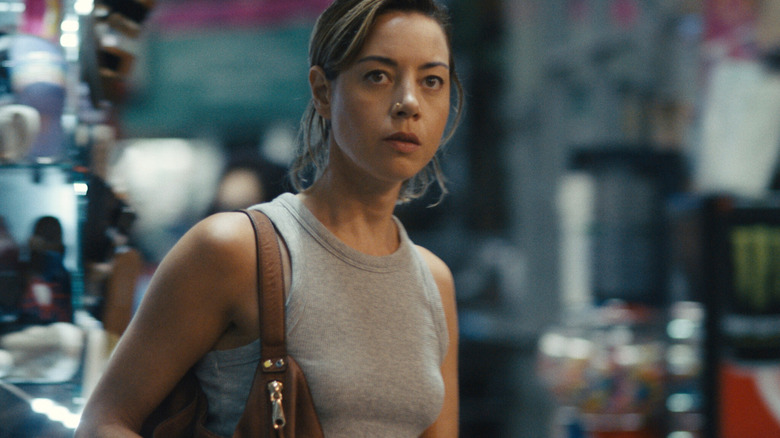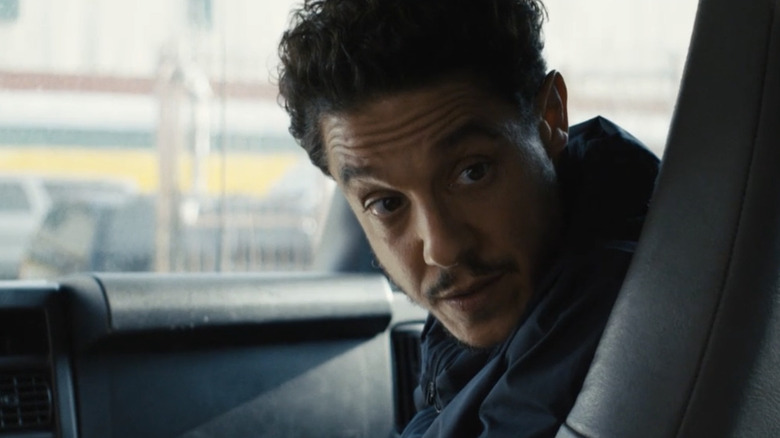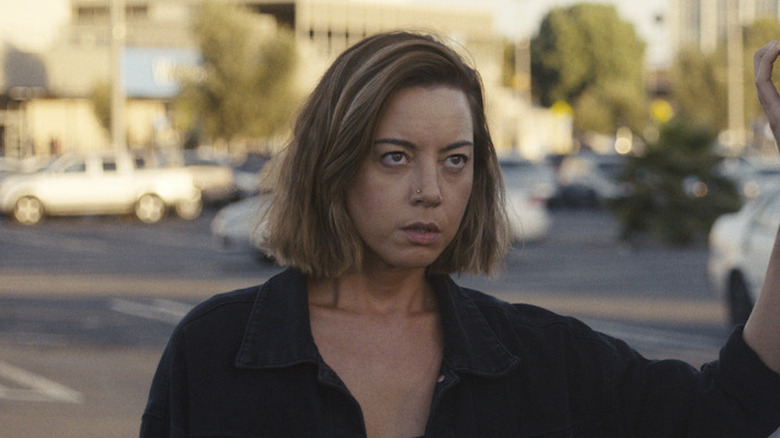The Daily Stream: Emily The Criminal Is A Pulpy Dissection Of The Gig Economy
(Welcome to The Daily Stream, an ongoing series in which the /Film team shares what they've been watching, why it's worth checking out, and where you can stream it.)
The Movie: "Emily The Criminal"
Where You Can Stream It: Netflix
The Pitch: When this film opens, Emily Benetto (Aubrey Plaza) is not a criminal. A New Jersey transplant now living in Los Angeles, she's looking far and wide for legitimate work but finding no luck. On top of the normal challenges with securing a job these days, she has an assault conviction on her record. With her incomplete college degree leaving her with nothing but student loans to pay, she's forced to work in food delivery without the benefits of full-time employment.
One of her co-workers points her to a $200/hour gig, which turns out to be a fraud operation run by Youcef (Theo Rossi). Emily is assigned to purchase items, from a simple TV to a whole car, with stolen credit card numbers. Enjoying more money than she's used to, Emily gradually commits to fraud more and more. It's not that different from any other gig, plus she's actually getting paid what she's worth. With her new illicit income, she hopes to finally realize her dreams of making art and traveling the world. She'll have to avoid getting caught first, though, by both the police and rival criminals.
Why it's essential viewing
If you're scrambling to see new releases before 2022 ends, I can't recommend "Emily The Criminal" highly enough. Not just because it's great, but because it's a movie that feels of the moment. Its politics aren't subtle, but rather than wielding a megaphone, it paints a portrait — a damning one. Everything is driven by Emily's debts, her desire to escape them, and how she's backed into a corner time and time again before committing fraud is her only option. In his review of "Emily the Criminal," Critic Sean Burns writes, "The politics are interwoven into the story instead of superimposed on it," and I couldn't agree more.
Trying to find any job outside the service industry is unrewarding. You can send out four dozen resumes and cover letters and feel lucky if you hear back from one. When you have extra hurdles like Emily, from a perceived lack of experience or a criminal record, this goes from difficult to insurmountable. "Emily The Criminal" doesn't confine its commentary to one angle either, since while its target is the job market, it's really focusing on multiple issues woven together.
Take the American criminal justice system. Said system is de facto "once a criminal, always a criminal." Rehabilitation doesn't stick because ex-cons can't find well-paying jobs. Emily is experiencing this firsthand, and if you've ever been in her shoes, you'll be rooting for her even as grows more "despicable." When she finds out an interview is for an unpaid internship, she storms out and voices everything you've ever wanted to say to bosses who make such insulting offers.
Resting on a lead performer's strength
"Emily the Criminal" is directed by John Patton Ford in his feature debut. He does a good job, making you curious to see what he'll do next. In particular, when Emily steals the car (and is on a time limit before the vendors realize something's up), Ford, relying mostly on character close-ups, makes the scene as suspenseful as can be.
Still, it's never a bad idea for an inexperienced director to stack his cast with well-honed actors. Aubrey Plaza is rarely absent during the 95-minute runtime, so it's a good thing she has screen presence to spare. Plaza sinks into her character; her trademark deadpan mood is channeled into exasperation. Emily has the grit of pluckiness but not the optimism.
The rest of the ensemble is small, for this is definitely the Aubrey Plaza show. Theo Rossi, formerly the resident butt-monkey Juice on "Sons of Anarchy," gets to flex his charm as Youcef. Like Emily, he has dreams of something better; no one chooses crime if they have other options available.
Gina Gershon shows up for one scene as Alice, the aforementioned internship interviewer Emily meets. She's onscreen for too little time to be fully fleshed out, but you still get a sense of her character. She had to struggle once, but all that means is that others should have to as well. The outcome of the interview is a second-act low point, but Emily's anger flips that on its head, turning disappointment into catharsis.
The messages of "Emily the Criminal" are political, not moral. While Emily decided that crime does pay, that only happened because no other jobs did.


